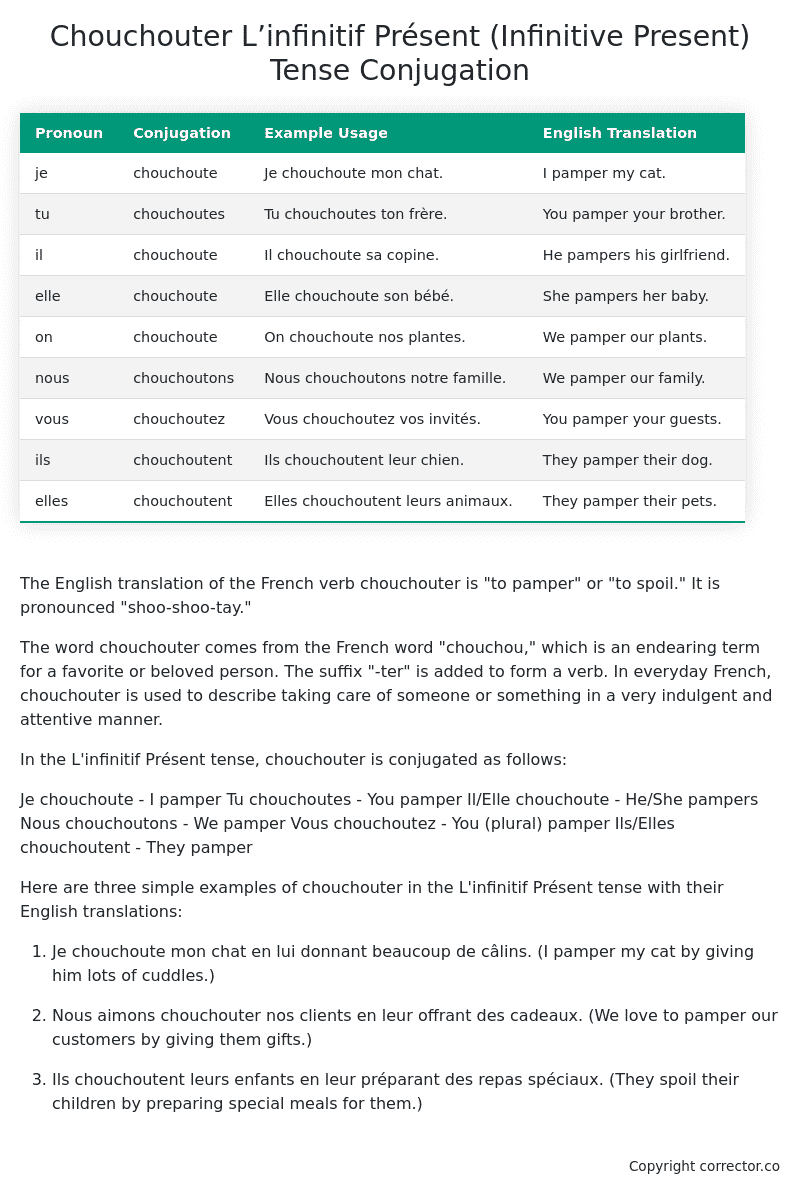L’infinitif Présent (Infinitive Present) Tense Conjugation of the French Verb chouchouter
Introduction to the verb chouchouter
The English translation of the French verb chouchouter is “to pamper” or “to spoil.” It is pronounced “shoo-shoo-tay.”
The word chouchouter comes from the French word “chouchou,” which is an endearing term for a favorite or beloved person. The suffix “-ter” is added to form a verb. In everyday French, chouchouter is used to describe taking care of someone or something in a very indulgent and attentive manner.
In the L’infinitif Présent tense, chouchouter is conjugated as follows:
Je chouchoute – I pamper
Tu chouchoutes – You pamper
Il/Elle chouchoute – He/She pampers
Nous chouchoutons – We pamper
Vous chouchoutez – You (plural) pamper
Ils/Elles chouchoutent – They pamper
Here are three simple examples of chouchouter in the L’infinitif Présent tense with their English translations:
-
Je chouchoute mon chat en lui donnant beaucoup de câlins.
(I pamper my cat by giving him lots of cuddles.) -
Nous aimons chouchouter nos clients en leur offrant des cadeaux.
(We love to pamper our customers by giving them gifts.) -
Ils chouchoutent leurs enfants en leur préparant des repas spéciaux.
(They spoil their children by preparing special meals for them.)
Table of the L’infinitif Présent (Infinitive Present) Tense Conjugation of chouchouter
| Pronoun | Conjugation | Example Usage | English Translation |
|---|---|---|---|
| je | chouchoute | Je chouchoute mon chat. | I pamper my cat. |
| tu | chouchoutes | Tu chouchoutes ton frère. | You pamper your brother. |
| il | chouchoute | Il chouchoute sa copine. | He pampers his girlfriend. |
| elle | chouchoute | Elle chouchoute son bébé. | She pampers her baby. |
| on | chouchoute | On chouchoute nos plantes. | We pamper our plants. |
| nous | chouchoutons | Nous chouchoutons notre famille. | We pamper our family. |
| vous | chouchoutez | Vous chouchoutez vos invités. | You pamper your guests. |
| ils | chouchoutent | Ils chouchoutent leur chien. | They pamper their dog. |
| elles | chouchoutent | Elles chouchoutent leurs animaux. | They pamper their pets. |
Other Conjugations for Chouchouter.
Le Present (Present Tense) Conjugation of the French Verb chouchouter
Imparfait (Imperfect) Tense Conjugation of the French Verb chouchouter
Passé Simple (Simple Past) Tense Conjugation of the French Verb chouchouter
Passé Composé (Present Perfect) Tense Conjugation of the French Verb chouchouter
Futur Simple (Simple Future) Tense Conjugation of the French Verb chouchouter
Futur Proche (Near Future) Tense Conjugation of the French Verb chouchouter
Plus-que-parfait (Pluperfect) Tense Conjugation of the French Verb chouchouter
Passé Antérieur (Past Anterior) Tense Conjugation of the French Verb chouchouter
Futur Antérieur (Future Anterior) Tense Conjugation of the French Verb chouchouter
Subjonctif Présent (Subjunctive Present) Tense Conjugation of the French Verb chouchouter
Subjonctif Passé (Subjunctive Past) Tense Conjugation of the French Verb chouchouter
Subjonctif Imparfait (Subjunctive Imperfect) Tense Conjugation of the French Verb chouchouter
Conditionnel Présent (Conditional Present) Tense Conjugation of the French Verb chouchouter
Conditionnel Passé (Conditional Past) Tense Conjugation of the French Verb chouchouter
L’impératif Présent (Imperative Present) Tense Conjugation of the French Verb chouchouter
L’infinitif Présent (Infinitive Present) Tense Conjugation of the French Verb chouchouter (this article)
Struggling with French verbs or the language in general? Why not use our free French Grammar Checker – no registration required!
Get a FREE Download Study Sheet of this Conjugation 🔥
Simply right click the image below, click “save image” and get your free reference for the chouchouter L’infinitif Présent tense conjugation!

Chouchouter – About the French L’infinitif Présent (Infinitive Present) Tense
Forming the Infinitive Present
Common Everyday Usage Patterns
As a Verb’s Dictionary Form
After Modal Verbs
As an Imperative
In Infinitive Clauses
Interactions with Other Tenses
Present Tense
Future Tense
Conditional Tense
Passé Composé
Imperfect Tense
Subjunctive and Conditional Moods
Summary
Want More?
I hope you enjoyed this article on the verb chouchouter. Still in a learning mood? Check out another TOTALLY random French verb conjugation!


